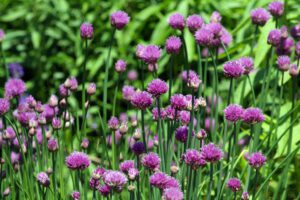If you are a gardener, or even just a homeowner who enjoys spending time outside in the back yard, you know that one of the biggest challenges is dealing with pests and insects like mosquitos. They turn an enjoyable weekend picnic outside into the center of attention at the party. These insects are a nuisance to children and adults alike. Fortunately, there is a natural solution to this problem! Below, in no particular order, are some of the most effective pest-repelling plants and where to plant them:
 Alliums (Perennial)–These herbs—including leeks, chives, and shallots—can help repel aphids, cabbage worms, slugs, and carrot flies. Plant Alliums next to rose bushes or in your vegetable garden to protect your tomatoes, peppers, cabbage, carrots, broccoli, etc.
Alliums (Perennial)–These herbs—including leeks, chives, and shallots—can help repel aphids, cabbage worms, slugs, and carrot flies. Plant Alliums next to rose bushes or in your vegetable garden to protect your tomatoes, peppers, cabbage, carrots, broccoli, etc.- Basil (Annual)– Basil is effective against deterring mosquitos, flea beetles, and cabbage webworms. It is also a fragrant herb useful in many recipes. Plant Basil in pots on your patio or deck to create a protective barrier.
- Catnip (Annual)— While our feline friends enjoy the smell of this plant, mosquitos and other insects surely do not. Plant Catnip in a sunny spot and be sure to give them enough space, as they spread easily.
 Lavender (Perennial)–This well-known purple perennial is not only fragrant, but also well known to repel mosquitos, moths, flies, and fleas. Plant lavender in sunny areas outside or place dried bouquets around your home. In addition to deterring pests lavender has many uses in the home including cooking, skin/hair treatments, and stress/anxiety reliever.
Lavender (Perennial)–This well-known purple perennial is not only fragrant, but also well known to repel mosquitos, moths, flies, and fleas. Plant lavender in sunny areas outside or place dried bouquets around your home. In addition to deterring pests lavender has many uses in the home including cooking, skin/hair treatments, and stress/anxiety reliever.- Chrysanthemums (Semi-Perennial)– Chrysanthemums contain pyrethrum, which helps repel numerous pests including ants, roaches, ticks, lice, fleas, bedbugs, spider mites, Japanese beetles, and more. Plant chrysanthemums along the border of your garden to keep an array of pests at bay.
- Mint (Perennial)– This is another fragrant and effective mosquito repellent but be careful where you plant mint as it spreads voraciously. Instead of planting it in the garden, plant mint in pots and place it near doorways or in window boxes. Mint is a weed when planted in beds but, can be cut back, trimmed, or divided and shared. No matter what mint will keep on keeping on.
 Citronella grass (Annual)– Most people have heard of citronella candles and mosquito repellent sprays, but did you know it is a grass? This natural alternative to DEET can be rubbed on the skin and is safe for children. It can grow up to six feet tall, so it is also ideal as a decorative grass.
Citronella grass (Annual)– Most people have heard of citronella candles and mosquito repellent sprays, but did you know it is a grass? This natural alternative to DEET can be rubbed on the skin and is safe for children. It can grow up to six feet tall, so it is also ideal as a decorative grass.- Lemongrass (Annual)– This tropical herb grows also contains citronella and grows three to five feet tall. Plant Lemongrass in pots on the patio or in the back of flower beds.
- Marigolds (Annual)– These bright golden blooms have a scent that deters insects and even small rodents. Plant Marigolds in flower beds or in vegetable gardens to keep rabbits and mosquitoes at bay.
 Petunias (Annual)– These annual flowers come in a variety of bright colors and can help repel aphids, beetles, tomato worms, and squash bugs. However, their slight licorice fragrance can attract slugs and caterpillars. Plant Petunias in flower beds, vegetable gardens, or even in decorative hanging baskets on your front porch.
Petunias (Annual)– These annual flowers come in a variety of bright colors and can help repel aphids, beetles, tomato worms, and squash bugs. However, their slight licorice fragrance can attract slugs and caterpillars. Plant Petunias in flower beds, vegetable gardens, or even in decorative hanging baskets on your front porch.
Using plants that repel pests and insects is a great way to keep your garden healthy and thriving without chemical repellants. Not only do these plants help to keep pests away, but they also add beauty and variety to your landscape. Give them a try and enjoy more time outdoors this summer!
 Alliums (Perennial)–These herbs—including leeks, chives, and shallots—can help repel aphids, cabbage worms, slugs, and carrot flies. Plant Alliums next to rose bushes or in your vegetable garden to protect your tomatoes, peppers, cabbage, carrots, broccoli, etc.
Alliums (Perennial)–These herbs—including leeks, chives, and shallots—can help repel aphids, cabbage worms, slugs, and carrot flies. Plant Alliums next to rose bushes or in your vegetable garden to protect your tomatoes, peppers, cabbage, carrots, broccoli, etc. Lavender (Perennial)–This well-known purple perennial is not only fragrant, but also well known to repel mosquitos, moths, flies, and fleas. Plant lavender in sunny areas outside or place dried bouquets around your home. In addition to deterring pests lavender has many uses in the home including cooking, skin/hair treatments, and stress/anxiety reliever.
Lavender (Perennial)–This well-known purple perennial is not only fragrant, but also well known to repel mosquitos, moths, flies, and fleas. Plant lavender in sunny areas outside or place dried bouquets around your home. In addition to deterring pests lavender has many uses in the home including cooking, skin/hair treatments, and stress/anxiety reliever. Citronella grass (Annual)– Most people have heard of citronella candles and mosquito repellent sprays, but did you know it is a grass? This natural alternative to DEET can be rubbed on the skin and is safe for children. It can grow up to six feet tall, so it is also ideal as a decorative grass.
Citronella grass (Annual)– Most people have heard of citronella candles and mosquito repellent sprays, but did you know it is a grass? This natural alternative to DEET can be rubbed on the skin and is safe for children. It can grow up to six feet tall, so it is also ideal as a decorative grass. Petunias (Annual)– These annual flowers come in a variety of bright colors and can help repel aphids, beetles, tomato worms, and squash bugs. However, their slight licorice fragrance can attract slugs and caterpillars. Plant Petunias in flower beds, vegetable gardens, or even in decorative hanging baskets on your front porch.
Petunias (Annual)– These annual flowers come in a variety of bright colors and can help repel aphids, beetles, tomato worms, and squash bugs. However, their slight licorice fragrance can attract slugs and caterpillars. Plant Petunias in flower beds, vegetable gardens, or even in decorative hanging baskets on your front porch.